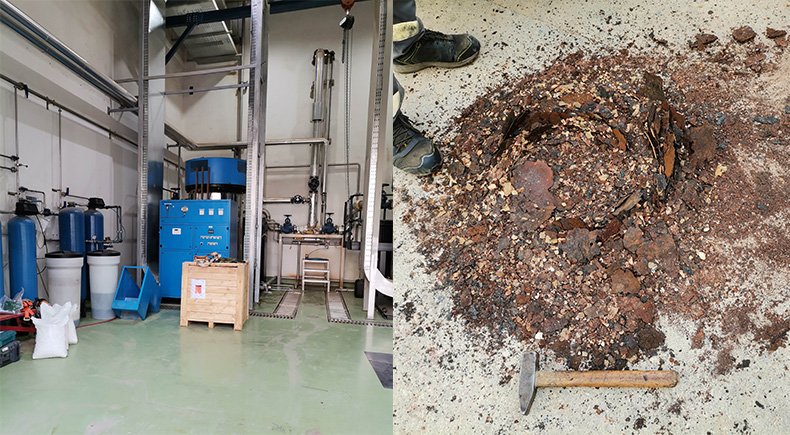When it comes to industrial equipment, few systems work harder than boilers. But when maintenance is overlooked – especially water treatment – the consequences can be severe.
This was recently demonstrated by leading South African manufacturer of boilers and supplier of water treatment components, Allmech, during a service trip to the Kingdom of Saudi Arabia. Theo Boshoff, senior boiler technician at Allmech, encountered a situation where ignoring OEM water quality recommendations led to the premature and costly decommissioning of boiler.
Boshoff explains that Allmech had installed the boiler at a facility in Saudi Arabia and was returning to undertake an inspection. “At the time of installation, our specialists emphasised the importance of maintaining strict water quality standards, specifically, feedwater conductivity between 200 µS and 350 µS, and boiler water conductivity below 1200 µS,” he says. “These thresholds are critical to ensuring efficient and safe operation, particularly in electrode boilers where conductivity directly influences performance.”
However, despite initial improvements made by the client to upgrade their feedwater treatment system, further deviations from these guidelines occurred. “Over time, poor-quality water led to an aggressive internal environment, ultimately causing severe corrosion to the boiler shell. The damage reached a point beyond repair, forcing the client to decommission the boiler entirely. Ironically, the attempt to save money by delaying proper treatment ended up costing significantly more in the long run,” Boshoff says.
Why conductivity matters in boilers
Water conductivity is a measure of how well water carries electric current. This ability depends on the number of dissolved ions (e.g. in salts, chlorides and sulphates) in the water. These are referred to as total dissolved solids (TDS). The higher the TDS, the higher the conductivity. In electrode boilers, excessive conductivity can result in uncontrollable current flow, posing a risk to the system and the safety of personnel.
Unchecked conductivity leads to pitting corrosion and compromised structural integrity; increased energy consumption due to reduced efficiency; and frequent breakdowns and costly repairs. “As we saw in the Saudi Arabian example, high TDS damages the boiler shell,” says Boshoff. “That’s why the recommended
TDS levels in the Allmech electrode boiler at any time must be below 1200 µS. The recommended µS levels in the feed water tank must also be as low as possible to allow smooth operation of the boiler, which is usually within a range of 200 µS and 350 µS.”
Preventing high conductivity
High conductivity is preventable through routine blowdown procedures, correct dosing of treatment chemicals, and investment in reverse osmosis or demineralisation systems. However, many boiler operators underestimate the importance of maintaining optimal water conditions, choosing to cut costs by skipping preventative maintenance, until it’s too late.
“As we often remind our clients, a boiler is not a ‘set-and-forget’ machine,” says Boshoff. “Regular maintenance, inspections, and water testing are vital and can significantly extend the lifespan of a boiler, and ensure it continues to operate at optimal efficiency. This delivers savings on energy bills and helps to prevent costly repairs.”
The most common mistakes Allmech sees boiler operators making include ignoring water quality recommendations, delaying corrective actions despite early warnings, and underestimating the long-term costs of poor maintenance.
Expert recommendations
“Our advice is to stick to the OEM service schedule, to dose feed water with the correct treatment chemicals (like A101+), and to never skip annual inspections,” says Boshoff. “In South Africa, an inspection by an Approved Inspection Authority (AIA) is required every 36 months – something many clients overlook until it’s too late.”
Regular servicing allows issues to be identified and addressed before they become major problems, reducing the risk of unexpected breakdowns. Boshoff suggests working with a supplier who can assist with a holistic boiler maintenance solution.
“For example, at Allmech, we don’t just install boilers – we partner with clients throughout the lifecycle of their systems,” he says. “We offer expert advice during commissioning, provide tailored water treatment solutions, conduct thorough servicing and fault-finding, and follow up with regular check-ins to ensure ongoing efficiency. The lessons from Saudi Arabia are clear: don’t cut corners when it comes to conductivity and boiler maintenance. In this industry, the price of neglect is always higher than the cost of prevention.”

